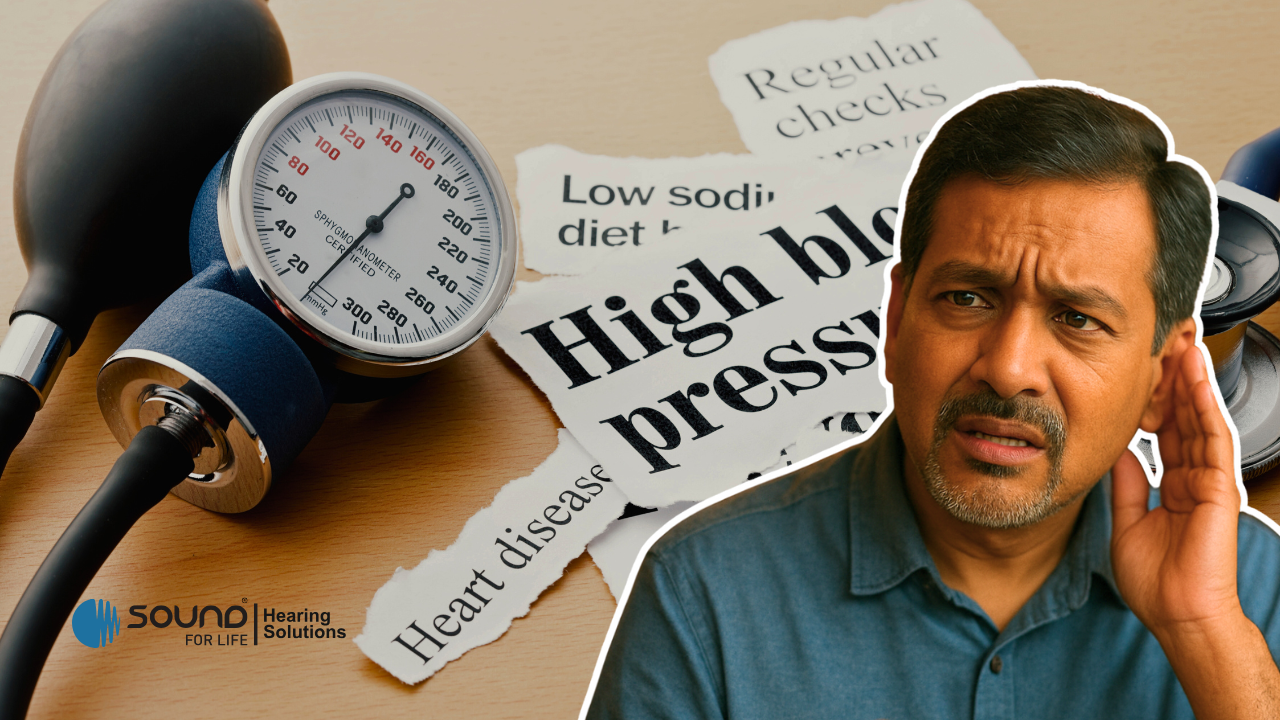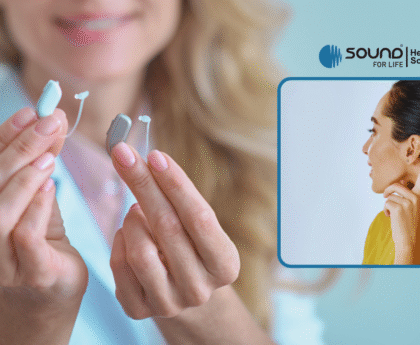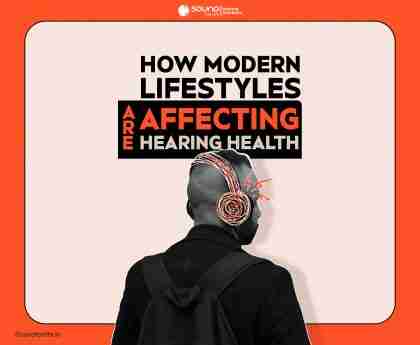Did you know that your high blood pressure might be silently affecting your hearing without you knowing it?
High blood pressure (also termed hypertension) is frequently considered a “silent killer” since it destroys your body without presenting visible signs and one of the lesser-known outcomes is hearing loss.
Many people know that high blood pressure may affect the heart, kidneys, and brain, but not many know that it can also damage the fragile parts of the inner ear. This can cause hearing problems, ringing in the ears (tinnitus), or even irreversible hearing loss.
We will talk about how high blood pressure can impair your hearing, what signs to look for, and what you can do to keep your ears safe in this blog.
What High Blood Pressure Means
High blood pressure happens when the force of your blood pressing against the walls of your arteries is regularly too high. Over time, this pressure can damage blood arteries throughout the body, including those that feed the cochlea — the region of your inner ear responsible for hearing.
Normal vs. High Blood Pressure Levels
| Blood Pressure Category | Systolic (Top Number) | Diastolic (Bottom Number) |
| Normal | Less than 120 | Less than 80 |
| Elevated | 120–129 | Less than 80 |
| Hypertension (Stage 1) | 130–139 | 80–89 |
| Hypertension (Stage 2) | 140 or higher | 90 or higher |
| Hypertensive Crisis | Above 180 | Above 120 |
If your readings are consistently above normal, you may be at risk of not only heart or kidney disease, but also hearing problems.
How High Blood Pressure Affects Hearing
The inner ear needs a lot of small blood capillaries to provide oxygen and nutrients to the hair cells that sense sound. These microscopic blood arteries can get narrower, thicker, or damaged when blood pressure is high, which makes it harder for blood to get to the ear.
Over time, this damage can lead to:
- Reduced oxygen supply to the cochlea
- Stress and inflammation in the circuits that send sound to the brain
- The death of sensitive hair cells, which cannot grow back
If these hair cells are destroyed, hearing loss can be permanent.
The Science Behind It:
Studies have shown that people with persistent hypertension generally perform the worst in hearing tests, especially at high frequencies.
Researchers think that high blood pressure makes blood flow less well, which causes ischaemia (lack of oxygen) in the cochlea, making hearing less sensitive.
In simple words:
When your blood pressure is high, your ears do not receive the healthy blood flow they need for functioning properly, and your hearing may steadily go worse.
Warning Signs: When Your Ears Are Affected by High Blood Pressure
You might not notice or feel any changes in your hearing right away. But here are some warning signs idicating that high blood pressure might be impacting your hearing health:
- Having trouble hearing people talk in loud places
- Having to turn up the volume on your TV or phone a lot
- Feeling full or pressure in the ears
- Sometimes feeling dizzy or having trouble keeping your equilibrium
- Tinnitus occurs when the ears keep ringing, buzzing, or hissing.
- Hearing loss that happens suddenly in one or both ears
If you have any of these symptoms, especially sudden hearing loss, you should consult a doctor at the earliest. It may be reversible if treated early.
Hearing Loss, High Blood Pressure, and Ageing
Hypertension and presbycusis, or age-related hearing loss, are both frequent in older persons. When they happen at the same time, they might make hearing loss happen faster.
- Blood vessels gradually lose their flexibility as we become older.
- This stiffening develops faster in persons who have high blood pressure.
- Because of this, the little blood vessels in the inner ear have a hard time getting adequate oxygen and nutrients.
This means that early detection and managing high blood pressure early is very important for keeping your hearing healthy, especially for people over 40.
Tinnitus with High Blood Pressure
A lot of people with high blood pressure also have tinnitus, which is a constant ringing or buzzing sensation in the ears.
This happens because elevated blood pressure can make the blood flow more quickly around the ear or affect the small capillaries that supply the hearing system.
How to Know if It’s Related to Blood Pressure
If your tinnitus gets worse when you are stressed, nervous, or your blood pressure goes up, it might be because you have high blood pressure (hypertension).
Getting your blood pressure under control often helps reduce the intensity of tinnitus.
Who Is at Risk?
High blood pressure can cause hearing issues in anybody, although some populations are more likely to get them:
- People who are 40 or older
- People who have high blood pressure that isn’t regulated
- People who have diabetes or high cholesterol
- People who smoke and drink a lot
- People who are regularly around loud noises (such industries, traffic, and music)
- People whose families have a history of hearing loss
Prevention: Keeping Your Heart and Hearing Healthy
The good news? You can keep your heart and hearing healthy by living a healthy life.
Here are some useful tips:
1. Check your blood pressure often.
Use a digital monitor to keep track of your readings at home.
- Perfect: Less than 120/80 mmHg
- If you detect a steady rise, see a doctor right away.
2. Follow a diet that is good for your heart.
A diet that is balanced is good for both your heart and your hearing.
Include:
- Fresh fruits and veggies
- All grains
- Lean proteins like chicken, fish, and lentils
- Foods with less salt
- Foods high in potassium and omega-3s, such as bananas, spinach, and salmon
Avoid:
- Too much salt, fried food, or processed snacks.
- Drinks with sugar and alcohol
3. Exercise Regularly
Just 30 minutes of walking, biking, or doing yoga every day can:
- Lower your blood pressure
- Make blood flow better to your inner ear
- Lower your stress levels (which might make tinnitus worse)
4. Take care of stress
Chronic stress can elevate blood pressure.
- Meditation or deep breathing could help.
- Listening to gentle music
- Being outside for a while
- Getting 7 to 8 hours of good sleep
5. Stay away from loud noises
Hearing loss can become worse when you are exposed to loud noises constantly and have high blood pressure at the same time.
When it’s too loud, wear ear protection or keep the volume of your headphones below 60% of the maximum.
6. Stop smoking and drink less alcohol.
Nicotine and alcohol can make blood vessels smaller, which makes both high blood pressure and hearing loss worse.
7. Regular check-ups for hearing
Get your hearing examined every year, just as you get your blood pressure checked. This is especially important if you have a history of high blood pressure or diabetes.
Diagnosis: How to Tell If High Blood Pressure Is Causing Hearing Loss
If you have high blood pressure and think you could have hearing impairments, an audiologist may suggest:
- Pure-tone audiometry: To find out what frequencies you can and can’t hear.
- Speech audiometry: To see how well you comprehend what people say.
- Tympanometry: To check how well the middle ear works.
- Otoacoustic emissions (OAE) test: To check the health of the cochlea in the inner ear.
These tests might help to determine whether your hearing loss is related to blood flow issues caused by high blood pressure.
Treatment And Management
Hearing loss caused by high blood pressure can occasionally be partially reversible if it is detected early, but in many cases it may be permanent.
However, with the right combination of medical care and hearing solutions, you can manage both conditions effectively.
1. Keep Your Blood Pressure Under Control
- Do what your doctor says about taking medicine and making adjustments to your life.
- Never stop taking your medicine all at once without talking to your doctor.
2. Use hearing aids, if needed
Hearing aids today are stylish, unobtrusive, and very useful. They can:
- Make sounds louder naturally
- Make talks clearer
- Less stress and loneliness that come with hearing loss
At SFL Hearing Solutions, we offer a wide range of advanced digital hearing aids from top brands like Phonak and Signia, with personalized fitting and aftercare support.
3. Take care of tinnitus.
- Relaxation therapy
- Sound treatment (using noise in the background)
- Hearing aids that can help with tinnitus by disguising it
How Blood Flow Affects Hearing Health
Your ear is like a “micro organ” that needs microscopic blood arteries to work.
When blood flow is at its best, your hearing stays keen. Hearing is worse when blood flow is weak.
This is the reason why physicians often say,
“What’s good for your heart is good for your ears.”
One of the most powerful ways to preserve your hearing naturally, is to maintain your blood pressure and try to keep it normal as much as possible.
When to See a Hearing Specialist
If you observe any of the following, see a hearing care professional:
- Changes in hearing that happen quickly or slowly
- Tinnitus or fullness in the ear that doesn’t go away
- Hard to keep up with chats
- Feeling dizzy or off balance
Early treatment can help protect your hearing from becoming worse.
At SFL Hearing Solutions, our professionals are trained to find out what is causing your hearing problems, whether it’s being around loud noises, having diabetes, or having high blood pressure. They will then help you choose the best therapy or equipment.
In conclusion
High blood pressure may damage more than just your heart; it can also affect your hearing.
You may greatly lower your chance of hearing loss, tinnitus, and other ear problems by keeping your blood pressure under control.
So, the next time you go to the doctor to get your blood pressure checked, keep this in mind: your heart health is also important for your hearing health.
Take the Next Step with SFL Hearing Solutions
Don’t ignore it if you have high blood pressure and have begun to have trouble hearing or ringing in your ears.
Call your nearest SFL Hearing Solutions clinic now and book a free hearing test.
Our team provides:
- Full hearing tests
- Fitting hearing aids to each person
- Hearing care tips for those with diabetes or high blood pressure
Take care of your hearing today; it’s one of your most important sense organs.
Disclaimer
This article is for educational purposes only and should not replace professional medical advice.
Please see a skilled doctor or audiologist if you think you might have high blood pressure or hearing loss so they can provide you with the right diagnosis and treatment.





